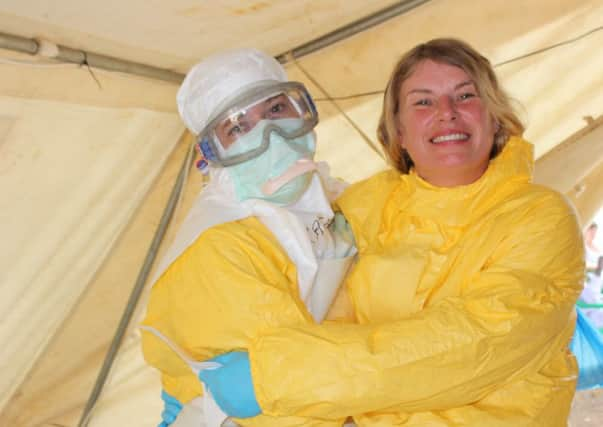How I helped to fight Ebola


Sitting in her cosy North Yorkshire cottage it is hard to imagine that just a few months ago Cokie van der Velde was at the front line of the terrifying Ebola virus.
As she tries to surround herself by the normality of village life such as the local quiz night, tending her garden and enjoying fish and chips at a local pub, it is clear that her thoughts are never far away from the horrors she has seen and the friends she has lost.
Advertisement
Hide AdAdvertisement
Hide Ad“When you are out there you really don’t have time to think too much about what is happening. It is when you get back that it really hits you and you have to keep busy.”
The sanitation expert for aid charity Medicins San Frontieres has just been named Woman for the Year at a glittering awards ceremony last month attended by Nicole Kidman.
“It was a huge surprise, but a very wonderful one,” she says of the award which was for her work during the high to the Ebola outbreak in Liberia and Guinea.
“But the award wasn’t just for me, I collected it on behalf of everyone who works with ebola. I didn’t do anything particularly different from anyone else.” Others may disagree. The 55-year-old grandmother who lives in Whixley joined MSF when her son had grown up and left home.
Advertisement
Hide AdAdvertisement
Hide AdShe sold her management development business and decided to travel, riding her motorbike through different countries for a year. “But I found that totally unfulfilling. I was no good if I wasn’t working. I had always wanted to work for an aid organisation, but with a young child it was impossible but once he had left home it was the time to do it”
She applied to MSF and after an interview in London she was accepted and soon found herself on her first “mission” to Turkmenistan.
“I have always loved travelling and adventure so it wasn’t just about altruism,” she explains. “But I also I have a strong belief that the world should be a fair place and I wanted to do something towards making a difference, no matter how small, to making it fairer.”
Cokie was thrown in at the deep end as she was the first person on the ground at the start of the project, in 2004 . She supported the paediatric, infectious diseases, intensive care and maternity wards of the town hospital. She was in charge of initiating the mission and employing all staff.
Advertisement
Hide AdAdvertisement
Hide Ad“It was a real challenge as it was my first mission and I was in charge of setting it up. It was a steep learning curve but I loved it.” Cokie loved it so much that she ended up staying for more than a year before being given another mission. “I will never forget the people I worked with over there. It was time to move on, there really wasn’t enough work for me to do, but it broke my heart.”
After Turkmenistan she was moved to the Congo and it was there she decided to retrain as a water and sanitation expert.
“The problem with being a logistician is that you are stuck in the office most of the time while the sanitation experts get out into the field.”
It was through this job that Cokie found herself in Guinea and then Liberia right at the start of the Ebola outbreak.
Advertisement
Hide AdAdvertisement
Hide Ad“There really was very little in place to cope with what was happening,” recalls Cokie. “We had to set virtually everything up and train the staff in a rigid sanitation regime.
“It was my job to make sure infection was kept under control, to train people in how to wear the personal protective equipment and teach the protocol for getting in and out of high-risk areas in the ebola management centres. The staff were terrified as were the patients.”
Cokie says a lot of the staff were too afraid to touch the dead bodies but she was determined to give them some dignity in death.
“It’s my job, I never think this is too dangerous. This is the work I want to do. The more dangerous it is the more our help is needed.”
Advertisement
Hide AdAdvertisement
Hide AdHowever, when the first international aid worker contracted the disease things changed.
“You start to think ‘is there something different about this Ebola outbreak?’ We were constantly taking our temperature before we went to bed and you did wake up every morning wondering if this was the day you might start to show symptoms. I was in charge of the infection control and I was like a wolf prowling around making sure everyone followed the rules.”
When Cokie returned to England for a few weeks in between her stints in Liberia, she decided to stay in doors and keep away from people.
“My daughter in law asked that I didn’t see my grandchildren as she didn’t want the parents at school to treat them differently. I understood. There had been a lot of hysteria in America.”
Advertisement
Hide AdAdvertisement
Hide AdCokie is currently spending a few well-earned weeks at home in Whixley awaiting her next mission which could take her anywhere in the world.
“I’ve just had a job offer in Ethiopia but I turned it down. It is too soon. I like to have eight weeks between missions.”
MSF does give psychological support to its workers to help them cope with returning home.
“When I’m in the field I don’t dwell on it. But when I come home I am much more affected by it. But I have some great friends and family although you don’t want to burden them with what you’ve seen. I like a glass of red wine and talk with other people from MSF who can understand.”